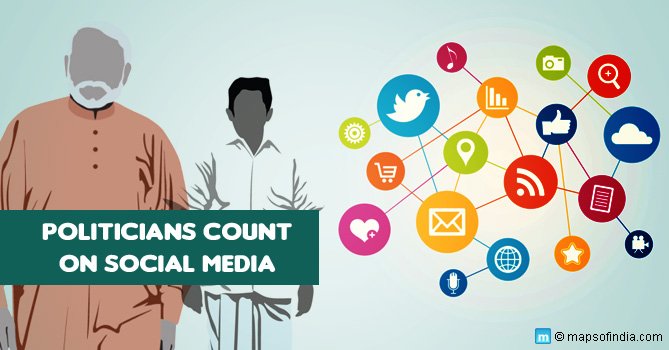In the vast landscape of Indian politics, the influence of social media has become increasingly pronounced, reshaping the dynamics of public discourse and political engagement. Platforms like Facebook, Twitter, and Instagram have emerged as powerful tools for politicians and citizens alike to express opinions, disseminate information, and participate in discussions. This intersection of social media and politics brings forth a complex web of opportunities and challenges, where the digital realm plays a pivotal role in shaping political narratives and influencing public opinions.
1. The Rise of Social Media in Indian Politics
a. Accessibility and Reach
Social media platforms provide a level playing field, allowing politicians to connect with a vast audience regardless of geographical constraints. This accessibility enhances political reach, enabling leaders to communicate directly with constituents.
b. Real-Time Communication
The instantaneous nature of social media facilitates real-time communication. Politicians can swiftly respond to events, share updates, and address concerns, creating a dynamic and responsive political environment.
2. Political Campaigning in the Digital Era
a. Targeted Messaging
Social media enables politicians to tailor their messages based on demographics, interests, and geographic locations. This targeted approach allows for more personalized communication with different segments of the electorate.
b. Digital Advertising and Campaigning
Political campaigns leverage digital advertising on social media platforms to reach specific demographics. The use of sponsored content, videos, and interactive campaigns has become integral to the modern political toolkit.
3. Citizen Engagement and Grassroots Movements
a. Amplifying Citizen Voices
Social media serves as a platform for citizens to express opinions, engage in discussions, and amplify their voices. It provides a space for democratic dialogue, allowing individuals to participate actively in shaping political narratives.
b. Grassroots Mobilization
Movements and protests find a powerful ally in social media. Platforms facilitate the rapid dissemination of information, mobilizing citizens for grassroots movements and raising awareness about various social and political issues.
External Source Links:
- Election Commission of India: The official website providing information about elections and electoral processes in India.
- Pew Research Center – Social Media Use in 2021: Insights into social media usage trends globally.
4. Challenges of Social Media in Indian Politics
a. Spread of Misinformation
The rapid spread of information on social media can lead to the dissemination of misinformation and fake news. This challenge requires effective fact-checking mechanisms to maintain the integrity of political discourse.
b. Polarization and Echo Chambers
Social media can contribute to the creation of echo chambers, where users are exposed primarily to content that aligns with their existing beliefs. This polarization can hinder constructive political dialogue.
5. Regulatory Framework and Ethical Considerations
a. Need for Regulation
The evolving landscape of social media in politics necessitates a robust regulatory framework. Guidelines and regulations can address issues like misinformation, data privacy, and the ethical use of digital tools in political campaigns.
b. Ethical Conduct on Social Media
Politicians and political entities need to adhere to ethical standards in their use of social media. Transparent communication, fact-based content, and respect for diverse opinions contribute to a healthier online political environment.
Conclusion: Navigating the Digital Political Terrain
As social media continues to play a pivotal role in Indian politics, it is imperative to recognize its potential while addressing the challenges it presents. The dynamic interplay between technology and politics requires a thoughtful and ethical approach to ensure that social media platforms contribute positively to the democratic process.
FAQs:
Q1: How can citizens discern reliable information from misinformation on social media?
A1: Citizens can discern reliable information by cross-verifying facts from multiple sources, following credible news outlets, and being aware of the potential biases of the information they encounter. Fact-checking websites can also be valuable resources.
Q2: What role does social media play in influencing voter opinions during elections?
A2: Social media plays a significant role in influencing voter opinions by providing platforms for political discourse, candidate communication, and the dissemination of campaign messages. It can shape perceptions, especially among the tech-savvy younger demographic.
Q3: How can policymakers balance freedom of expression on social media with the need for regulation?
A3: Policymakers can balance freedom of expression by developing regulations that target harmful activities such as hate speech, misinformation, and abuse while preserving the democratic exchange of ideas. Clear guidelines and transparent enforcement mechanisms are essential.



